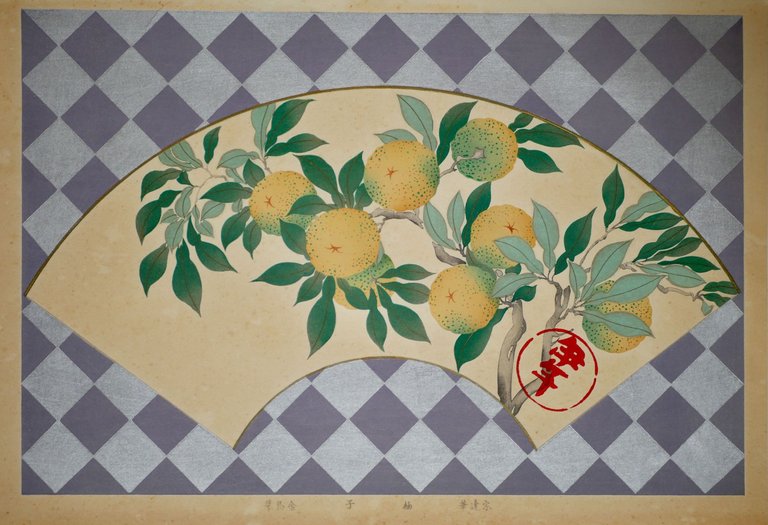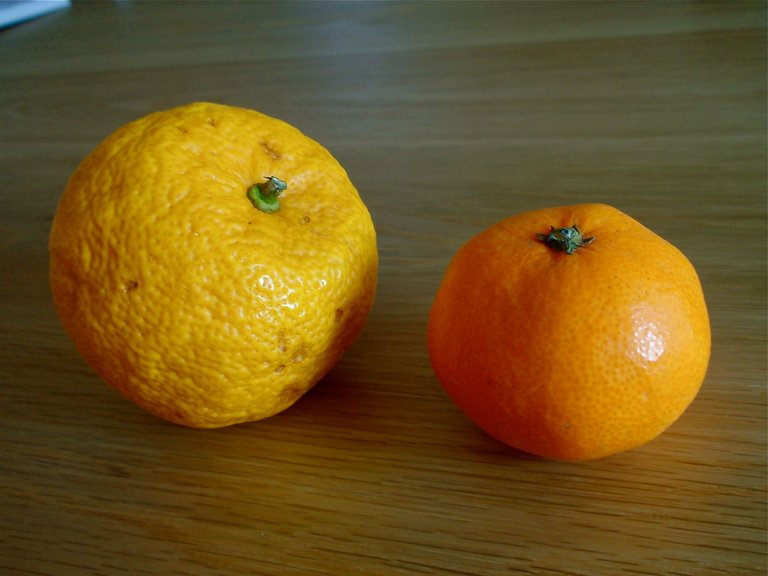Gifts of Nature ~ Haiku of Japan
One day about ninety years ago, Santōka was seemingly at the end of his wondering and was in a good mood.
yūzora kara yuzu no hitotsu o morau
I pluck one yuzu
—Santōka


Santōka wrote this in his diary on Oct 12th 1933. He had just moved into his hermitage in modern day Yamaguchi City, named Gōchuan (其中庵), the month before. He was 51 at the time and was looking forward to finally settling down. For the previous 17 years he had criss-crossed Japan by foot, walking from town to town, begging for enough money survive and writing haiku.
In addition to this haiku, he also wrote in his diary that he was looking forward to settling down and focusing more on farming than haiku.
私もだん〱落ちついてきました、そして此頃は句作よりも畑作に身心をうちこんでをります、自分で耕した土へ自分で播いて、それがもう芽生えて、間引菜などはお汁の実としていたゞけるやうになりました、土に親しむ、この言葉は古いけれど、古くして力ある意義を持つてゐると痛切に感じました。
I have gradually found peace and, of late, I'm investing my body and soul more into farming than in composing haiku. I sow seeds with my own hands into the soil I've cultivated. They've already begun to sprout, and the thinned greens can now be savored in soups. The phrase 'becoming intimate with the soil' might be old, but I deeply felt its enduring and potent significance.
This entry is somewhat uncharacteristic of his usual diary entries, most of which are talking about sake or haiku or yelling at himself. It seems he really was trying to turn over a new leaf. That shows in the the haiku he wrote, where we can see his joy at a gift farm and mother nature gave him.

Yuzu (left) compared to mandarin orange (right) - from Wikipedia
Yuzu is similar to a lemon, kind of a yellow clementine with bumpy, tough skin. It is a much beloved fruit in Japan and is used for many things, including various foods and cooking and in alcohol. On the winter solstice it is common to add the fruit to one's bath, where it is thought to help the skin and health.
Santōka wrote free verse haiku (not 5-7-5) and rarely used a kigo (season word) purposely, but in this haiku yuzu is a kigo. It's a kigo for late autumn, which we are now already in according to the traditional way of reckoning the seasons.
Let me know if you have any thoughts or questions in the comments!
❦
 |
David LaSpina is an American photographer and translator lost in Japan, trying to capture the beauty of this country one photo at a time and searching for the perfect haiku. |
That is, me! If you like this translation, feel free to use it. Just credit me. Also link here if you can. ↩
Very interesting. That's too bad that he was so hard on himself. We're all the haiku writers at the time male?
Women have always been into haiku, and in all poetry, but yeah it was mostly the men who got famous for it at the time and before. There have been a handful of women through the years who did manage to get well known for it.
That is cool. It doesn't surprise me too much given the struggle most women have had to be recognized through the years, but I thought maybe it would be different somewhere else :)
Santoka! I love his haiku a lot. His haiku level is very high because his style is like Jazz. People usually have enough knowledge of the classical style when they are good at Jazz. I think we need to have a basic traditional haiku style before attempting Santoka's haiku, or perhaps some people start with the Santoka style from the beginning. I have no idea, but I enjoy reading his style, even though my haiku knowledge is not that high. Your English subtitles always help me understand Japanese haiku!"
I really like the smell of yuzu. I had never seen yuzu on the street until I moved to Honshu from Hokkaido. I loved seeing fruit trees on the street.
I think Santōka is my favorite haiku poet. His haiku are so... I don't know how to say it. So "real". Bashō is very zen about everything and that is good. Buson very scholarly, always referring to the Tang era Chinese poets. Issa is very playful and childlike. Shiki is very picturesque. But Santōka.. he has a way of being so real. This is how things are. I can't emulate his style. It is unique and it is really fantastic. I love his poems!